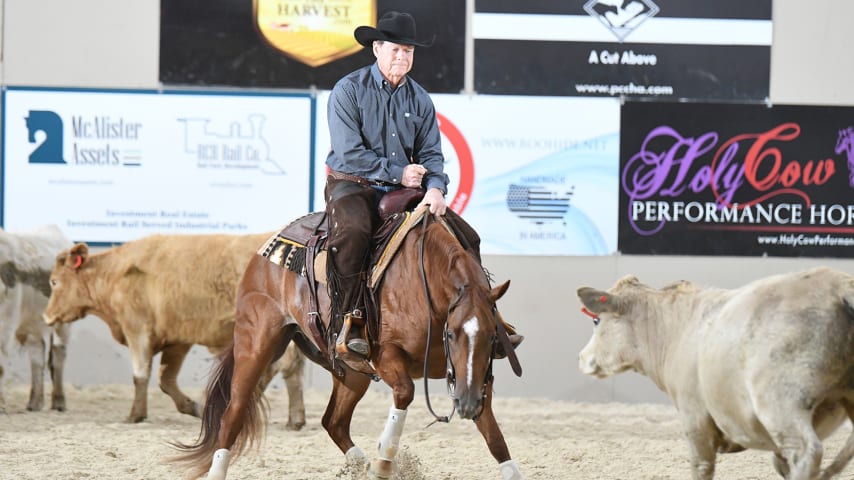Tom Watson not horsing around with his newest passion
6 Min Read

Written by Bob McClellan
For anyone who wants to see Tom Watson in competition, try an arena in the Southwest, not St. Andrews.
Watson the golfer has yielded to Watson the horseman. Because of his wife Hilary's love for cutting horses, the player who ranks sixth all time in major championship victories is now five-plus years into his career as an amateur cutting horse competitor.
“She got on the back of a world champion cutting horse back in Oklahoma in the early 2000s, and I knew I was destined to be somebody to watch her ride cutting horses, because she loved it so much,” Watson, 72, said of Hilary, who passed away of cancer in fall 2019. “She learned. She was a good rider at the beginning, but you have to have a lot of experience. She gained that experience, became an excellent rider, did well in national cutting horse events.
“About five and a half years ago, I had been watching her at these horse events, and I am biting the bullet. I said, ‘I don’t want to watch anymore, I want to do it.’”
Watson had plenty of room on his farm in Kansas where he could ride and work horses, and that’s when and where he started. He made a contact who knew about cutting horses, and together they went and purchased a good practice horse to begin with.
And Watson’s desire to get better has grown since, which is no surprise to those who know the fiery competitor from the links.
“Now, these five-plus years later, I have a nice facility down in Weatherford, Texas, and I’ve got several horses on which I can compete,” Watson said. “I love going to horse shows and competing on the back of One Alley Cat, which is my best horse, and the other horses that I have. It really provides me a lot of pleasure.”
Watson said he competes at about a dozen horse cutting shows a year, which is a lot more than he plays competitive golf. During the 2020-21 PGA TOUR Champions super-season, Watson played only twice – both times at the Mitsubishi Electric Championship at Hualalai to open the year.
He will again compete at the Mitsubishi Electric Championship in Hawaii this week before turning his attention back to his cutting horses.
Cutting horse events vary in size, and Watson does most of his competitive riding in Texas and Oklahoma. He said there might be only 10 to 15 competitors in his class.
So what is a cutting horse? The World Golf Hall of Famer explains.
“The way it works, there’s a real ranch discipline to cutting,” Watson said, growing more animated. “Picture this: You have a herd of cattle out there, and you’ve got a sick cow in the middle of that herd. You’re on the back of a horse, and your job is to separate that sick cow out of that herd, so you can do whatever you need to do to it. You can doctor it, you can remove it and put it in a different pasture, but you have to cut it out of that herd. You have to cut it. You have to separate it. That’s the game. The game is to be able to separate a cow from the herd.
“Now, if you run into that herd very fast, that herd is going to explode because the cows are scared of you. The object is to walk into that herd very slowly and walk up to your cow and basically move it out of the herd. That’s the game, and the game is, once that cow is out of the herd, that cow wants to get back into the herd in the worst way. And now, the real excitement begins, because now you have to throw the reins down. You can’t use the reins to guide the horse, as you did when you were walking through the herd to cut it. You have to put the reins down. And that cow wants to get back in that herd, and you have to keep it from getting back in the herd. You’re like a sheep dog; you can’t let it back in the herd, and the object is to try to go back and forth to stop the cow going this way, to stop the cow going that way, either way, to try and keep that cow centered in the middle of the herd of the arena that you’re in.
"Because that cow wants to get past you and back to the herd for safety, it feels threatened, it feels scared, and you have to try and keep the cow from getting back into the herd, for a period of usually about 20 seconds. And it is judged. You have a judge that’s judging your performance … how well you cut the cow over the herd, and how well you keep it from getting back into the herd.”
Competitors have two and a half minutes to cut three cows out of a herd. And then they “work” those cows for 10 to 45 seconds each. When time is up, a buzzer sounds and the rider is scored.
“And you hope that you get a score of 74 or 75, that’s what you hope for, that’s a great score, that means that you’ve done your job and the horse has done its job,” Watson said. “And you’ve picked the right cows to work your horse.”
Watson said he has gotten better over time. He’s confident on his horse and able to anticipate its movements.
Watson’s goal when he began to ride cutting horses was to top former PGA TOUR and PGA TOUR Champions compatriot Hal Sutton and his win total of $42,000 as a cutting horse competitor. He achieved that goal in November at the Waco (Texas) Futurity event.
Watson has earned close to $45,000. His next goal is to top $50,000.
“I just had a nice conversation with Hal … we had a chuckle over it, because he competed on cutting horses back in the '90s,” Watson said. “When I started this thing, I said, 'I’ve gotta have goals,' and my goal was to surpass his $42,000 lifetime earnings.”
Watson doesn’t see many similarities between golf and cutting horses other than both disciplines require focus and engage his competitive side.
“I don’t feel as many nerves cutting as I do playing competition golf, but there are nerves. There are some,” Watson said. “You can get … you can understand that there is a pressure on, and you’ve got to perform, and you can feel that. Yes, you can.”







